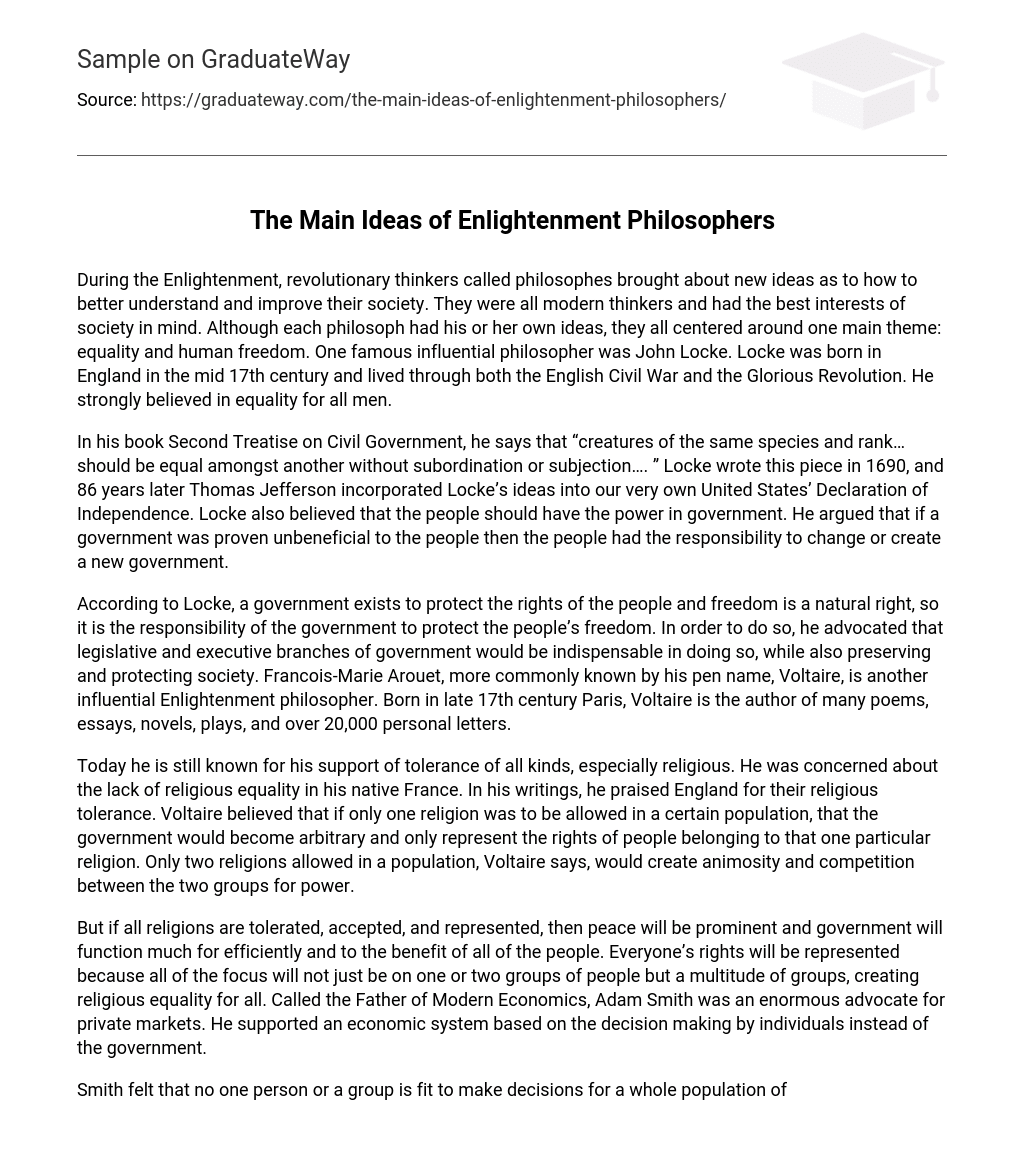During the Enlightenment, a group of progressive thinkers called philosophes transformed society with their innovative ideas. Despite their differing viewpoints, these modern intellectuals shared a common objective: comprehending and improving society. One highly influential philosopher in this movement was John Locke, who emerged in 17th century England during the English Civil War and the Glorious Revolution. Locke fervently supported equality for every individual.
In his book Second Treatise on Civil Government, Locke advocates for equal treatment of individuals within the same species and rank, opposing subordination. Thomas Jefferson incorporated Locke’s ideas into the United States’ Declaration of Independence, 86 years after its publication. Locke also argues for power to reside with the people in government and asserts that citizens have the responsibility to modify or establish a new government if it fails to serve them.
Locke argues that the government’s main duty is to protect people’s rights, including their natural freedom. He suggests that both the legislative and executive branches have a vital part in achieving this goal while also advancing societal well-being. Another significant Enlightenment thinker, Voltaire (Francois-Marie Arouet), was born in Paris during the late 17th century. Voltaire gained fame for his wide-ranging literary works, which include poems, essays, novels, plays, and an extensive collection of personal letters.
Voltaire is still celebrated for promoting tolerance, especially in matters of religion. He expressed his dismay at the lack of religious equality in France and praised England for their tolerant approach to religion. From Voltaire’s perspective, if only one religion was allowed in a population, the government would show favoritism towards that faith and neglect the rights of others. However, allowing only two religions would create animosity and lead to a power struggle between these two groups.
By promoting tolerance, acceptance, and representation of all religions, peace will prevail and the government’s efficiency will improve, benefiting everyone. This approach guarantees the acknowledgement of everyone’s rights by extending focus to encompass diverse groups rather than just a select few, thus ensuring religious equality for all. Adam Smith, referred to as the Father of Modern Economics, ardently endorsed private markets and an economic system where individuals make decisions independent of government intervention.
Smith argues that it is not acceptable for any person or group to have the power to make choices on behalf of an entire population. He believes that individuals are capable of deciding what is best for themselves. According to Smith, when people work towards improving their own economic situation, they also unintentionally benefit society and help advance the economy. If individuals are given the chance to earn more through hard work, most will indeed exert greater effort. Smith suggests that humans naturally tend to prioritize self-preservation and selfishness, although with some restrictions.
Smith advocates for the independence of individuals to follow their own passions and goals, without interference from the government, with the aim of enhancing the economy and attaining personal financial prosperity and happiness. In contrast, Mary Wollstonecraft, another philosopher, authored an array of texts including a history of the French Revolution, multiple novels, and a significant work titled Vindication of the Rights of Woman.
In her work titled Vindication of the Rights of Women, Wollstonecraft argues for women’s rights and freedom, asserting their equality to men. She believes that both genders must operate from the same principle in order to enhance humanity’s virtue. To achieve a happier and more peaceful society, it is crucial for women to have equal rights as men. Wollstonecraft firmly supports providing women with an equivalent education to men, as this would give them a deeper understanding of society and enable their public contributions. The Enlightenment philosophers, including John Locke, Voltaire, Adam Smith, and Mary Wollstonecraft herself, all embraced progressive ideas centered on equality and human liberty which played a transformative role in revolutionizing society and shaping the modern world for the betterment of all individuals.





